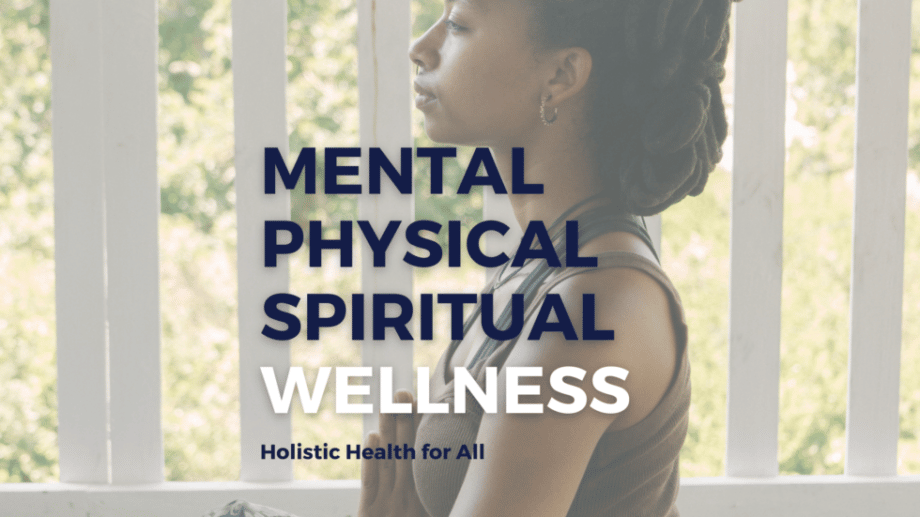We often associate health—as a concept—with our physical health and wellness. However, our health prospers when we foster our wellness holistically via mental, physical and spiritual practices. How we ought to support each element varies—what it looks like to foster health varies. Individuals have unique mental, physical and spiritual needs.
This post does not intend to prescribe explicit steps that will guarantee health. Rather, we want to offer accessible practices that may support you as you explore your unique health and wellness journey. Below you will find different habits that support each pillar of wellness, mental, physical and spiritual.
Mental Wellness: Two Daily Practices
You cannot discuss holistic health without acknowledging mental health. Below are two daily practices that may support you and your mind.
Practice Gratitude
Practicing gratitude supports an abundance mindset. When we intentionally acknowledge and appreciate what surrounds us, we support our brain in managing negative emotions. How you choose to practice gratitude is up to you!
If you struggle to note gratitude, consider starting small. In the evening, reflect on three moments you felt a sense of appreciation or peace. Voice them to yourself, and continue the practice until it comes naturally. Practicing gratitude allows us to implement the law of attraction in our favor. Humans are habitual. When you intend on ending your day with reflection—listing small winks of gratitude that occurred throughout the day—your brain will focus on moments to appreciate throughout the day. You seek out the good.
Think of it this way…what you appreciate, appreciates!
Set Goals & Priorities
We often hear that individuals that set goals are successful. Though this is a broad statement, there is truth in it. Setting and abiding in your goals supports overall performance. Goals offer anticipatory structure and reward. There is satisfaction in reaching a goal. By setting them in different areas of your life, you allow yourself routine satisfaction. Reaching the goals may support you feeling positive about yourself and your successes!
Spiritual Wellness
Wellness is a personal practice—especially when discussing spiritual wellness. Humans are innately spiritual beings, but how we choose to foster our spiritualities differs. Though this list is not exhaustive, below you will find practices that may support your individual wellness:
- Faith Communities: connect with similar individuals if you adhere to a specific faith
- Grounding: take time to feel present in your body and connect with the earth
- Meditate: allow your mind to deeply focus in silence for a set amount of time
- Journal: release and make sense of your thoughts in a tangible way
- Connect With Nature: take time to center yourself away from your standard scenery
Most importantly, find what works for you. Trial and error will allow you to find what best fosters your spiritual wellness. Be persistent and patient with yourself.
Physical Wellness: Two Daily Practices
When we discuss overall health, physical health is often the first to come to mind. Though other pillars of wellness are important, supporting our physical health is vital! Below are two daily practices that may support you and your body.
Snooze! The Importance of Sleep
We tend to underestimate the importance of adequate sleep times and the negative effects of too many sleep disruptions.
Average adults need 7-9 hours of sleep per night.
Studies recommend that the average adult needs seven to nine hours of sleep per night. Sleeping too little—and sleeping too much—can cause low energy. Sleep needs differ person to person, so if you have direct concerns, it is always best to speak directly to your healthcare provider.
Going to sleep and waking up at similar times each day supports sleep regularity. It is tempting to sacrifice sleep. However, intentional sleep allows us to show up where and when we need to. Our physical health is reliant on rest. Allowing ourselves rest—creating intentional sleep routines—supports physical health!
Staying Hydrated
Water! Water! Water! Though this concept may feel redundant, hydration is always important.
Drinking water promotes internal wellness. It benefits every body system.
It is generally recommended to consume 64 ounces—or eight cups—of water per day.
Average individuals may also use body weight to determine water intake: ounces of water consumed equates your body weight in kilograms. Example: if you weigh 70 kilograms, aim to drink 70 ounces of water per day.
If you are struggling to reach your water intake goal, consider implementing the chug method. On average, one second of chugging equates to one ounce of water. If you do a 10-second chug seven times throughout the day, you will likely reach the daily recommended value.
Key Ideas to Support Mental, Physical and Spiritual Wellness:
Our health prospers when we foster our wellness holistically via mental, physical and spiritual practices. Below are daily practices that work in conjunctions to support holistic wellness:
- Mental Wellness: consider implementing gratitude, goal & priority practices
- Physical Wellness: intentional sleep & adequate hydration support overall body health
- Spiritual Wellness: grounding, meditation & community may allow you to explore and foster your spiritual
Our minds, bodies and spirits are connected. Health comes when we take care of and integrate each element.

